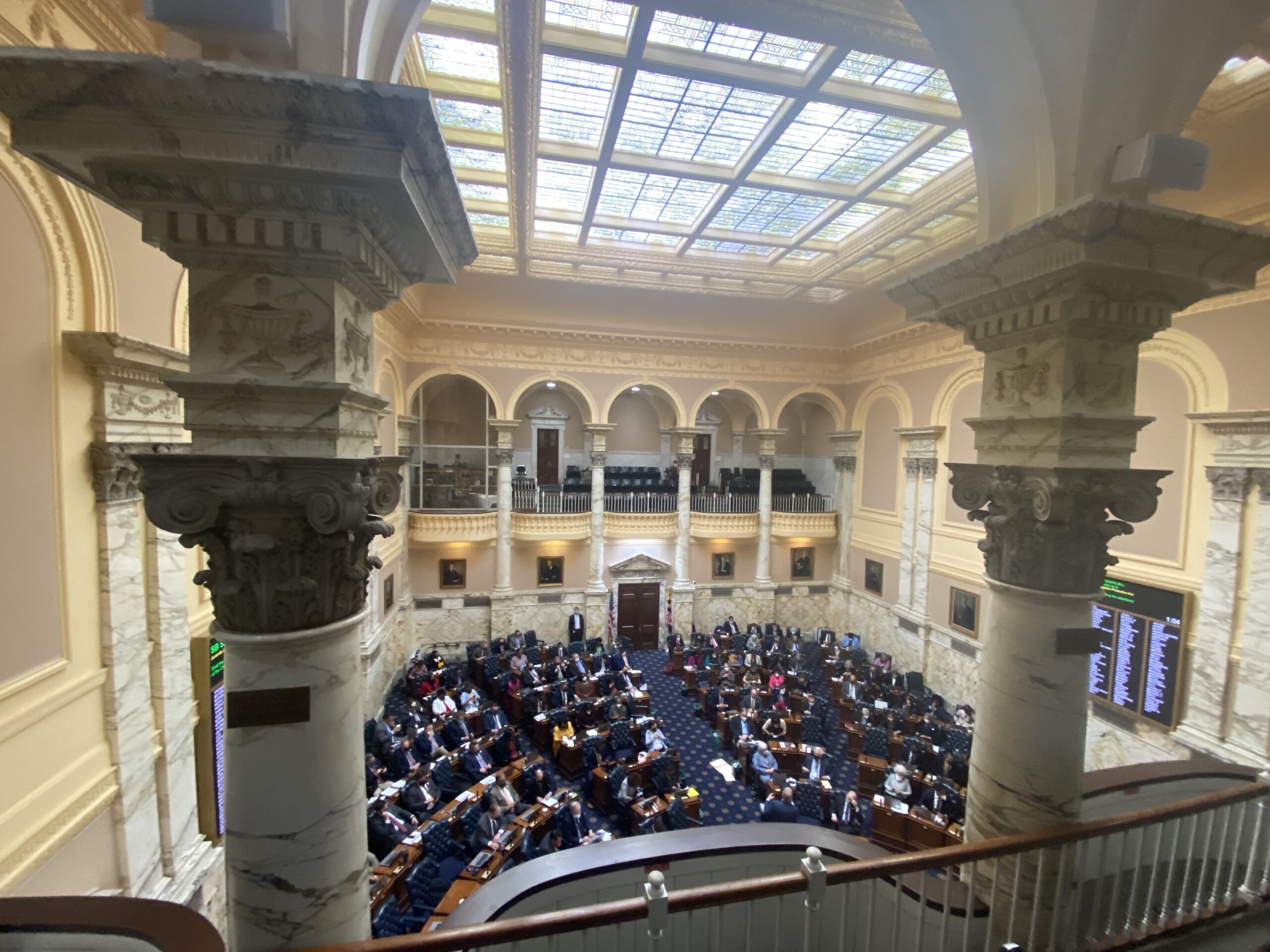With Legislative Overrides, Paid Leave and Abortion Access Bills Become Law in Maryland

The Maryland General Assembly voted on Saturday to override Gov. Lawrence J. Hogan Jr.’s vetoes of abortion access and paid leave bills, enacting the measures into law.
The bills were among 10 measures a Democratic supermajority in the legislature enacted over the Republican governor’s objection on Saturday.
House Bill 937, titled the Abortion Care Access Act, was overridden in the House of Delegates by a vote of 90-46, and in the Senate by a vote of 29-15.
The bill will expand who can perform abortions in the state to include nurse practitioners, nurse midwives and physician assistants.
It will also provide $3.5 million in financial support to clinically train health care professionals to offer reproductive services. The bill will also make the state’s existing abortion care coverage under Medicaid permanent, and require private health insurance plans — with exceptions for those with religious or legal exemption — to cover abortion care without cost-sharing or deductibles.
In a veto letter, Hogan said the bill “endangers the health and lives of women by allowing non-physicians to perform abortions.”
Debate in the Senate on the bill was limited by an earlier cloture motion.
On the floor of the House, Minority Leader Haven Shoemaker (R-Carroll) called the bill the “most radical expansion of abortion in Maryland’s history in a state that already has some of the most liberal abortion laws in the country.”
Del. Emily Shetty (D-Montgomery), pushed back and said the only examples offered by anti-abortion delegates on the floor where themselves radical arguments.
“It is not radical to provide health care when people need it,” she said.
Republicans said the bill would allow medical workers in Maryland to offer abortions in extreme circumstances, including allowing a 15-year-old to get an abortion at nine months pregnant. The bill does not expand the circumstances under which a woman can seek an abortion in Maryland, which is a protected right until a fetus is able to live outside of the womb; once viability is reached, abortions can be performed only if there is a fetal anomaly or to protect a woman’s health.
The paid family leave bill, Senate Bill 275, will offer Marylanders 12 weeks of partially paid leave each year to care for themselves or a close family member after a serious health issue, and up to 24 weeks of paid leave for new parents who also experience serious health issues.
The bill does not specify the contribution rate (or the amount deducted from payrolls) and the cost-share between employers and workers, leaving that up to the Department of Labor to decide by the end of this year.
Marylanders could start receiving benefits starting in January 2025, under the proposal. “What was the main reason to rush this?” Senate Minority Leader Bryan Simonaire (R-Anne Arundel) asked Saturday.
Sen. Antonio Hayes (D-Baltimore City), the sponsor of the bill, said that both chambers had a lot of time to debate the program. “It’s really in support of many Maryland families who just gave birth to a child or served as a caregiver,” he said, urging senators to vote to override the veto.
The Senate voted to override Hogan’s veto 30-16. A short time later, the House of Delegates voted 94-44 to enact the bill into law.
Advocates cheered the outcome.
“Two years of the pandemic have reminded us how important it is for workers to be able to balance work and family. With this paid leave program, workers will be protected from financial and potential job loss when family issues arise,” said Myles Hicks, campaign manager for the Time to Care Coalition, in a statement after the vote. “That’s good for workers, it’s good for employers and it’s good for Maryland.”
Mike O’Halloran, the state director for the National Federation of Independent Business, said the bill will increase labor costs in the state and stretch small businesses.
“Unfortunately, the legislature has just handed another bill to small businesses,” O’Halloran said. “…Maryland job creators who were fortunate enough to make it through COVID restrictions, record inflation, and persistent supply chain issues will now face a new payroll tax.”
Other vetoes
Lawmakers also debated and voted Saturday to override Hogan’s veto of Senate Bill 53, the Child Interrogation Protection Act.
Under the bill, police officers will be required to contact children’s parents or guardians and allow them to speak with an attorney before they’re interrogated. The policy does not preclude children from being interrogated by police.
House Minority Leader Jason C. Buckel (R-Allegany) said law enforcement and others are worried that the bill “will ultimately result — whether it’s one case, two cases, or 20 cases — in a very serious juvenile offender being able to get off from the consequences of a very serious juvenile crime, a violent crime, because of these provisions.”
In explaining her vote to override, Sen. Jill P. Carter (D-Baltimore City), the bill’s sponsor, called it an “important public safety vote.”
“On behalf of all of those children that have been harmed by the coercion and by coerced confessions, I’m happy to join this veto override,” Carter said.
The chambers voted along party lines to override House Bill 1021, sponsored by House Speaker Adrienne A. Jones (D-Baltimore County), which would require businesses that sell firearms to have 24-hour burglary alarm systems, as well as other safety measures including security bars, metal doors or physical barriers to prevent vehicles from crashing through.
Republican lawmakers argued that the bill would increase costs for small business owners, while lawmakers were penalizing gun store owners instead of strengthening penalties against those who steal firearms.
House Judiciary Chair Luke Clippinger (D-Baltimore City) defended the bill.
“All we’re saying is, if you’re selling guns in the state of Maryland, you would like me to take the steps to make sure the security of your business is paramount,” he said.
Another overridden bill, House Bill 90, introduced by Del. Shaneka T. Henson (D-Anne Arundel), will allow lawyers at the Office of the Public Defender to enter collective bargaining agreements. The bill also stipulates that public defenders will also only be able to be disciplined or fired for cause.
In vetoing the bill, Hogan wrote that the legislation will “shift the focus away from the clients upon which assistant public defenders are called to serve and assist.”
House Republicans echoed that argument Saturday.
Del. Jesse T. Pippy (R-Frederick) wrote that the bill will mean “the focus now is going to come off of the client and onto the public defender.”
Del. Gabriel Acevero (D-Montgomery County), who supported the override, said there is an “imbalance” between public defenders and prosecutors, with public defenders underfunded and with higher caseloads and clients by comparison.
“We talk a lot about the role and responsibilities of public defenders, but what we don’t talk about is: Who’s taking care of public defenders?” Acevero said.
Clippinger, an assistant state’s attorney in Anne Arundel County, likewise supported allowing the public defenders to unionize.
“If they want the right to collectively bargain their workplace conditions, I have absolutely no problem with that,” Clippinger said.
In another collective bargaining measure, the chambers voted to add sergeants and supervisors within the Maryland Transit Administration Police to the list of employees who can participate in collective bargaining.
The chambers also overrode Hogan’s veto on Senate Bill 1, which will allow the Maryland Department of Labor’s commissioner of labor and industry to investigate and send out stop work orders to state contractors and subcontractors that have violated the prevailing wage law.
Sen. Ed Reilly (R-Anne Arundel) stood against the bill, contending that he has not seen a court case in the last decade when a contractor charged with violating the prevailing wage law resulted in workers being made whole.
“It’s a solution looking for a problem — there isn’t one,” he said.
But Sen. Pamela Beidle (D-Anne Arundel), the lead sponsor of the bill, said that there were 887 prevailing wage and living wage violations in fiscal year 2021 and 1,394 violations in 2020. She also referred to a 2019 court case about a subcontractor requiring each of his employees to pay him back $200 a week so that they could stay on the job.
“These are the kinds of issues that we’re trying to resolve,” Beidle said. The new law will incentivize contractors to pay the correct prevailing wage and lead to less violations, she continued.
Lawmakers also enacted vetoed bills on Saturday that will establish more guidelines before a local health officer can be fired; require the Maryland Transportation Administration to increase commuter rail service and plan connections with nearby states; and expand the state’s prevailing wage requirements to state-funded service contracts for mechanical services.







 Creative Commons Attribution
Creative Commons Attribution